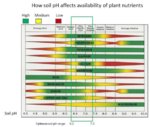I’ve been reading on this for my own water and food grade 75% phosphoric acid should be perfectly fine. Here is a link for acid calculator based on alkalinity and pH.
https://extension.unh.edu/Agric/AGGHFL/alk_calc.cfm
Site's down

And yes am sure 75% PA (unsure if real acronym ;p ), food grade, is fine- the thing that's got me wondering here is (well 2 things) what % is the General Hydroponics product, and can I get more PA/$ by going a non-hydroponics-product route? It's just the type of thing where I'm thinking "it's not a formula it's a single chemical" and reasoning that GH will have a mark-up selling it this way, that it's probably the type of thing you can get cheaper by just getting un-branded, but w/o knowing GH's % of PA I can't even start guessing and would sooner get theirs because it'd have instructions on usage (instructions I could copy-over when using a non-hydroponics product
if only I knew what %PA their pH-Down product contains)
In any case,
any drop in pH is important for me as I've got highly basic water and most of my trees actually want more acidic conditions than most plants, worst combo, so any downward adjustment is a good thing!
Do you have nutrient deficiency issues when your water with just tap water? Or is the reason for acid just based on your high pH? I looked back at your previous water post that showed you had pretty high pH water, moderately high alkalinity, but not bad TDS, Ca, or Mg. Your post also doesn’t show sodium which could be an issue close to the ocean, but your TDS has isn’t bad. If you are having problems, I would recommend getting a test should be $50-$100. If you are going to geek out on your water, you should know the bicarbonates which might be locking up your calcium at your low Ca levels (also look into adding gypsum for Ca as Smoke suggested on the other thread.)
I’m surprised you would have problems given how much it rains in Florida.
The rain here isn't constant it's concentrated from summer to fall:

, which is pretty sweet for me because this is my first growing-season where I've got established plants (began in late '16), and know far more than last year, and have way more material / benches for everything / better everything! But yeah we do get good rain and I'll be capitalizing on it this year, I've currently got ~70gal of rain-buckets (open-top) that fill up completely even from relatively moderate rains, and just this past week acquired a ~50gal drum (need to modify/create it still, haven't bought the hardware yet) so will be good *when the rain starts* but for the meanwhile, and for oct/nov., having the PA will be useful (am still worried about it inducing flowering, a large portion of my garden are bougainvillea and I do my best to keep them from flowering and fear that all the extra phosphorous will promote that, will see I guess!)
"Do you have nutrient deficiency issues when your water with just tap water? Or is the reason for acid just based on your high pH? "
I've never tried 'just tap' for any realistic amount of time, I consider these inorganic substrates more like top-fed hydroponics than I do 'normal containerized plants' and am of the mindset that smaller, more frequent fertilization is very beneficial so have never gone a while w/ only-tap. And yes it's exclusively the high pH, this is (I suspect) why I have such bad iron chlorosis issues that were not fixed when supplementing iron (my water is 8pH, if my substrate is basically inert/neutral pH then iron is this available:

so it's no wonder an iron issue couldn't be corrected by just adding iron....
Re gypsum/Ca/carbonates - can't carbonates be derived from the alkalinity and hardness values? And it's not just 'my low Ca levels' because I supplement calcium (use a mineral-mix alongside my miracle-gro, as well as some epsom salt on other days - don't want too much TDS in any particular watering), it's also that Ca just isn't taken-up by roots very well at 8pH in fact it's impacted worse than iron is! I've gotta get back to that thread I haven't checked replies there yet but the gypsum recommendation had me down a rabbit-hole and am in-agreement it's worthwhile and am going to get some



